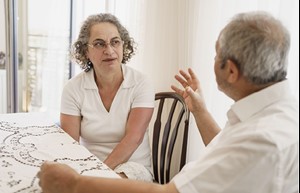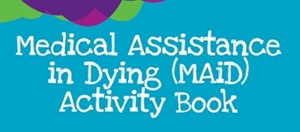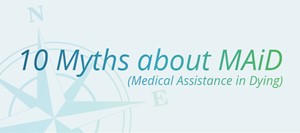Seeking information and starting the process
“The MAiD office was so helpful. After I made the call, I could feel myself relax…”
Once you have decided to explore the option of an assisted death, reaching out to the MAiD office in your area is the next step. Your options to get information are:
- Call the MAiD office or find information online for your area.
- Ask a healthcare provider to make a referral or to call the MAiD office for you.
- Ask a family member or friend to make the call.
Getting information and understanding what is involved to have a medically assisted death does not commit you to anything.
Resources
It can feel like a very big step to make that first call. You may have thought about MAiD for a long time and feel very sure this is what you want to do, or, you may feel hesitant, knowing a part of you wants this, and another part of you is unsure. You may just be curious and want to find out more about it.
It can be helpful to remember that you are never obligated to have MAiD. It is not uncommon to be feeling what seem like contradictory emotions all at the same time.
Whatever your thoughts and feelings, it can be helpful to express them. Consider talking to someone you trust who will listen and give you support.
If you have been asked to call the MAiD office for someone else, it can be a tough call to make. Remember that your job is to be the messenger. You are not deciding whether they will have an assisted death. You are helping them make their wishes known. It can be helpful to remember that the eligibility process helps the person make an informed decision about this option.
The law requires that you make your request in writing. Each province/territory has their own forms for this purpose. You will need to sign and date the request form in front of a witness, who:
- Must be at least 18 years of age and understand what it means to request MAID.
- Cannot benefit from the death - for example anyone who may be named in your will or who will receive property or items after you die.
- Cannot be an owner or operator of a health care facility where the individual lives or is receiving care.
- Cannot be an unpaid caregiver.
- Can be a paid health care worker or paid caregiver.
It can sometimes feel stressful to find a witness and have them sign the form at the same time as you. This can be especially true if you are feeling unwell or if you do not want your family or friends to know that you are requesting an assisted death. Talk to the MAiD office if you are not sure how to arrange a witness.
Sometimes the form is very long, repetitive and has a lot of legal language, which can feel overwhelming and confusing.
You might find yourself feeling sad, relieved, or other emotions when you sign the request form. It may make it feel more ‘real’ to see it in black and white on a piece of paper.
No matter how you feel about their request, helping a person complete a written request for MAiD can bring on mixed emotions. The legal language and lengthy form may be confusing and frustrating. Seeing the request in writing may make you feel any number of emotions: sadness, anger, resentment, fear. You may also feel a sense of comfort that you are able to help the person complete a difficult task. These are all common feelings in these circumstances.
Videos
More Articles

What is MAiD?

The application process for MAiD

Why do people consider MAiD?

Telling family and friends

Talking to children and youth about MAiD

Starting a conversation about MAiD with the person who is ill

Capacity and consent and why they are important

Having the assessments

Choosing when and where

Planning for the time left

Planning the day of MAiD

A medically assisted death

Grief after a medically assisted death

For healthcare providers







